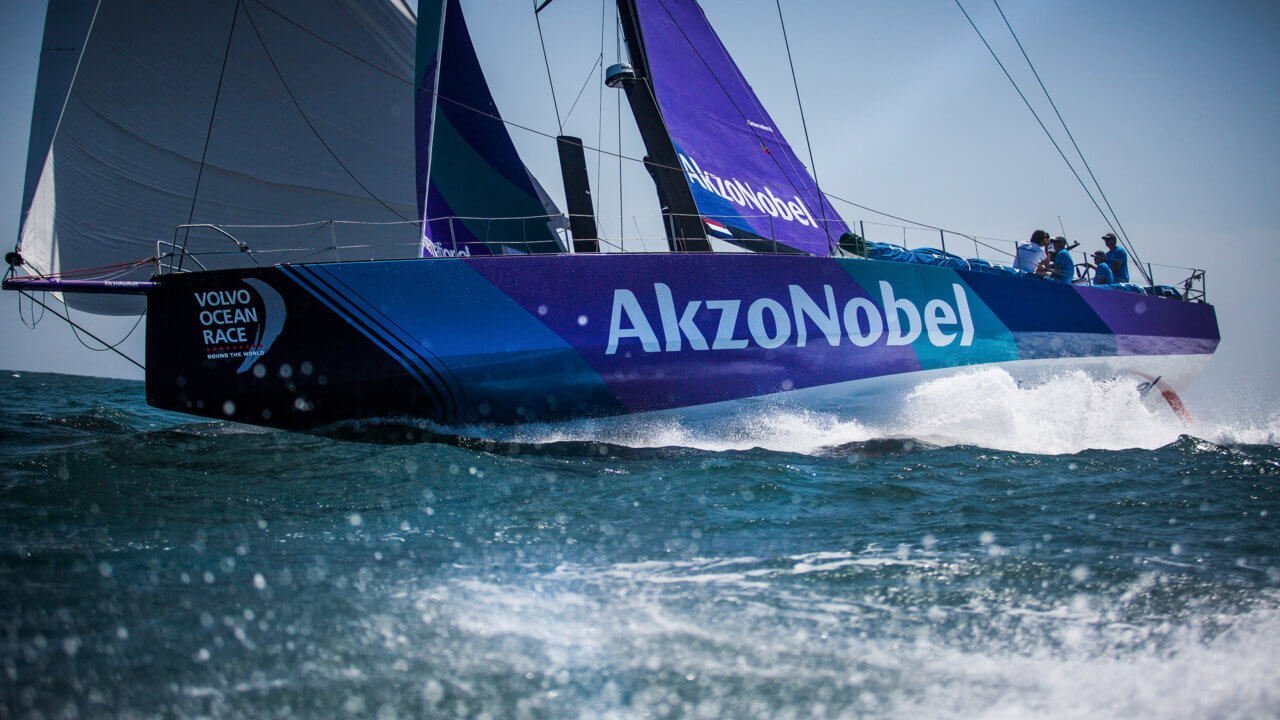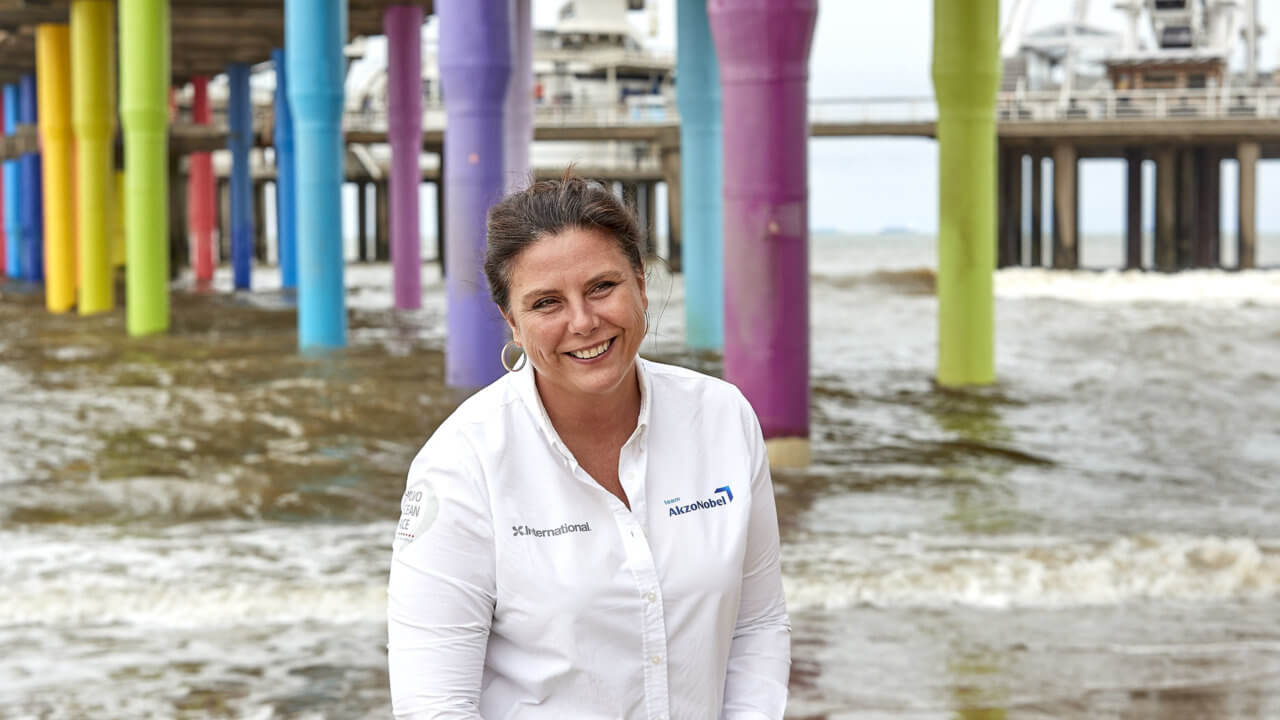Future-Proof Brand Series: Nathalie Quéré, AkzoNobel
Brand management shifting towards empowering users by making sure they understand the value of the brand

VIM Group
AkzoNobel is a leading global paints and coatings company and major producer of specialty chemicals. They operate in over 80 countries and have well-known brands such as Dulux, Interpon and Coral. Nathalie Quéré, former Director of Brand and Creative Services at AkzoNobel, spoke to us about brand challenges during company transformation, how technology can help companies create a ‘freedom in the framework’ for employees, and how AkzoNobel’s involvement in the Volvo Ocean Race has benefited their brand.
Nathalie Quéré of AkzoNobel
What is the biggest brand management challenge for AkzoNobel?
Nathalie Quéré: We’re in the middle of a big transformation as a company because we’re separating from our Chemicals division and refocusing on our Paint and Coating businesses. This impacts on our brand strategy because we’re reinventing ourselves while we are still AkzoNobel. The question is: how do you reinvent yourself within the same brand environment but with a completely different portfolio? We’re very attached to our brand, our name, and our history, but we are evolving.
Another challenge is that we have a hybrid brand architecture where, in addition to our product brands, we have non-branded products operating under the AkzoNobel name which contribute to 20% of the company. This creates complexity as what you do at a corporate brand level has an impact on your product brands.
Is brand more important now than ever – in general and for AkzoNobel?
NQ: Yes. By going through this change you reflect on the importance of the brand, the role of the brand, the equity you have in your brand, and you see the importance of that. I’ve never had so many discussions around the value of the brand than in the last year when we were really reflecting on changing our company.
What I’ve seen from studies we’ve done is that people in general are very keen to understand the core values of the company behind the brand. And that is something which relates strongly to the reasoning behind our endorsement strategy – to highlight the company brand, particularly for our product brands, because we know that consumers are interested in understanding what the company behind the brand is doing. What are our values? What do we believe in as a company? How do we behave as a corporate citizen? All questions that have become very important for the AkzoNobel brand. But it goes beyond the branding exercise – it’s really going to the core and the authenticity of the brand.
"I've never had so many discussions around the value of the brand than in the last year when we were really reflecting on changing our company."
Which trends are likely to have the largest impact on the AkzoNobel brand and its product brands?
NQ: A trend which affects all companies, is that brands now belong to everyone. We see how the brand is challenged on social media, which means you lose a big part of the ownership of your brand. As social media has become a really strong voice, there has been a dematerialisation of the brand. This can have a negative effect, but on the contrary, might enhance your brand because you get more opinions on it. In some cases, you see people playing with your identity which I think this is an interesting trend.
Holly Wilson: Do you feel that brands will become more controlled by how people talk about them on social media?
NQ: Yes and I think as a company you should embrace that because if you want to control it that’s not going to work in the world of today and tomorrow. It’s a bit like crowdsourcing or crowdfunding – somehow the closer you get to people, the stronger your brand becomes.
"The closer you get to people, the stronger your brand becomes."
What tools/technology do you use to manage the AkzoNobel brands?
NQ: We have a Brand Centre which is a repository of our brand-related material and guidelines. It’s a central portal which is available to all employees and agencies. As much as we are training people to use the brand, the portal is a great way to give access. It’s also a sharing platform to showcase what people around the world are doing with the brand. This is a very inspiring and a good way of getting new ideas and to stimulate creativity inside the organisation.
HW: It’s great that you can showcase all of this, which is quite a hard thing to do, especially in a global company.
NQ: Yes, it’s very hard because you discover things when you travel, and you don’t have many opportunities to visit those offices and see what is being created.
What we have seen over the past two years is that we have gone from being very much in control and implementing the guidelines exactly the way they are, to the approval process becoming more of a guide. I see that we need to take the next steps and my dream would be to simplify the brand guidelines or make them as flexible as possible because they are just supposed to be guidelines. We don’t need an approval process, we give the brand back to the users. Take our involvement in the Volvo Ocean Race, we created a spin-off of the AkzoNobel brand for this campaign. It’s quite interesting that by changing the visual identity a little bit but keeping the key components: the type, the name and colours, you might improve the brand impact. By creating freedom in the framework, you can really help keep the brand refreshed and interesting.
"My dream would be to simplify the brand guidelines or make them as flexible as possible."
Which brands do you admire or use as inspiration?
NQ: I find the Google brand very interesting and I like the fact that its visual identity changes all the time. I find this concept utterly inspiring. It creates a very dynamic perception of the brand and the changes don’t seem to have damaged its brand awareness or value. I also find brands like Uber fascinating because they have become massive even though they have existed for less than ten years. You use ‘Uber’ as a verb and that’s a whole other level of brand ownership. So those are the kinds of brands I take inspiration from; ones which are exponential and become large quickly.
How has your brand department changed over the past five years?
NQ: A lot! The brand team really changed when we started to work on creating a strong brand strategy about six years ago. We looked at how we could strengthen the AkzoNobel brand by having a stronger connection with our product brands. What has been the major change over the last year is the creation of an in-house creative team and in that sense really taking back full-ownership of the brand internally. We have worked with agencies in the past, but we felt we were losing the essence of the brand, so we had a very strong business case to keep it internally. By bringing the brand back internally, we have managed to create a really strong foundation and a lot of coherency. We are now able to test ideas in our brand community, around the world.
Where do you see the future of brand management in five years’ time?
NQ: Freedom in the framework, with digital technology helping us achieve this by allowing brand users direct access to the tools. I would like to see brand management in the coming years move away from acting as the ‘brand police’ and shifting towards empowering users by making sure they understand the value of the brand. It’s not just about providing some guidelines and a ‘go with it’ attitude, but creating enough education around how important the brand is so people can use it in a respectful way and in a certain framework of freedom.I see this as a company-wide change, rather than just within the marketing and branding departments. As a brand team we are there to give guidance, but we should be able to empower users much more.
"I would like to see brand management in the coming years move away from acting as the 'brand police' and shifting towards empowering users."

Can you tell me a little about AkzoNobel’s participation in the Volvo Ocean Race and why it’s important for the Akzo brand to participate in events like this?
NQ: About three years ago, we decided to take part and it was very much about creating more awareness for our company brand and generating a stronger connection with our product brands. The Volvo Ocean Race came as a great opportunity to talk about the AkzoNobel story. There are a lot of aspects of the race which are very close to AkzoNobel’s brand values and company values of Performance, Innovation, Teamwork and Sustainability. The fact it was a global event gave us the opportunity to be active in our key markets and allowed us to showcase our products, which made sense from a business perspective.
We supplied coating for the boats and were a partner on sustainability which gave us a platform to talk about this message. We also had a racing team which was interesting because this is what brings everything together. Being just a partner of the event would have been good but would not have helped us reach the objectives that we had. Having a team – that’s where you have your story and create emotions – that’s where you entertain your customers.
"The fact it was a global event gave us the opportunity to be active in our key markets and allowed us to showcase our products, which made sense from a business perspective."
We have calculated 74 million dollars of media value from the event. We had an objective of $50 million, so we are way beyond what we expected. We also had huge social media engagement. It was the first time as a company we could really bring the brand to life through a 360° activation plan where we reached almost 12 billion people in terms of engagement – cumulative of course! These are big numbers and in the history of the company we’ve never had such success from running a brand campaign. Campaigns like this can really help us build a strong brand.
-
Nathalie Quéré is the former Director of Brand and Creative Services at AkzoNobel.
Read more interviews in the Future-Proof Brand Series.
Related insights
Brand Management
Rebranding
Brand Technology
Markengeflüster: Exchange on Brand Strategies and Challenges
Brand Management
Rebranding
Brand Technology
Markengeflüster: Austausch zu Markenstrategien und Herausforderungen
Brand Management
Rebranding
Brand Technology



